by Jorge Patacas

Most people know actress and musician Jessica Pimentel for her role as María Ruiz in the Netflix series “Orange is the New Black” (2013-2019), but she’s been involved in many other projects in her career not only when it comes to acting, but also singing and playing in metal and hardcore bands. She was at the Inferno Music Conference in Oslo, Norway recently and we had the chance to do an interview with her to discuss how she got into metal, how she ended up being Brujería’s female vocalist, her collaboration with Slayer, her band Alhekine’s Gun, future plans and a lot more!
RISE!: – Is this your first time at Inferno?
Jessica Pimentel: Yes, this is my first time here.
R!: – How was your panel at the Inferno Music Conference?
JP: It was very lovely. I had a great moderator, Erin Lynch from FlyingFox, she’s awesome and we’re good friends. So it was just like a nice chat and both she and the audience asked really good questions.
R!: – How and when did you realize you wanted to become an actress? Were there any specific actors that inspired you?
JP: Great question. I didn’t realize that I wanted to be an actor. I started acting because I couldn’t play classical music at the level I wanted anymore due to having injuries on my wrist and my hands from overuse, but I was in a special school called Performing Arts High School in New York, some people might know it as Fame if you ever heard of that movie or the TV show “Fame”. So I went to that school and loved it very much, so they said that if I wanted to stay there, I had to try out for another area. So I tried out for the drama program and I made it in, then I developed a real love of acting. I wasn’t sure if it was what I always wanted to do, but all of a sudden it was something that grew in me as something I really love to do. From that point on, I continued with that, I went to conservatory after that and I got a degree in theater and that’s a very big love of mine.
R!: – You’re best known for your role in Orange is the New Black, but how was your path to get there? I know you’ve been in some episodes of Law and Order…
JP: When you major in theater, that’s not something that really makes most people famous, you know? I was doing a lot of theater at first and then as you’re starting out, you get small parts, so I did a lot of those. As people get to know you, things start to shift, you know? Then you start auditioning for bigger roles and eventually you get to a point where you can be auditioning for a seven-year role.
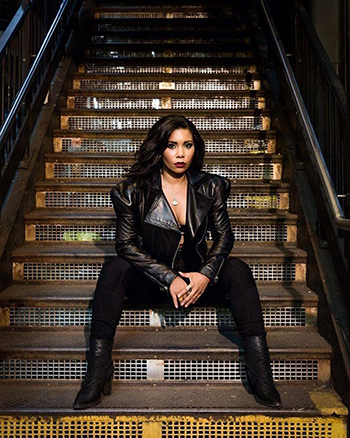
R!: – What did you learn from your experience working on Orange is the New Black?
JP: I mean, it was such a unique experience because it was the largest female cast ever. It was very wide in age range, many different body types, many different cultures represented. It represented all types of people, all of the communities out there struggling were all represented, so you got to look at things not just as an actor, but as a viewer. Things that we don’t necessarily think about, you know? I was saying earlier in the panel that I never thought about what it would be like for a woman who’s incarcerated, sometimes wrongly incarcerated as you find in some of the characters, to be pregnant and give birth in jail. That’s something I never ever thought of before that. And also how the prison system is set up for failure, not for success or real justice, but more like penance. Any little thing happens and all of a sudden you’re sentenced for one thing, but now you’re serving other things that happened because of these negative circumstances. It’s like going down the drain so to speak and I never really knew anything about that before that show.
R!: – Talking about music now, what was the first instrument you learned to play and how old were you?
JP: It was violin and I think I was about six. I mean, I think I might have had it younger, but I don’t think a two year old can really… (laughs). You know I can say I started playing violin when I was two, but we all play everything when we’re two, as long as you have it in your hands. So I would say I was six when I seriously started playing.
R!: – Why did you decide to study violin?
JP: I didn’t really decide to study. Again, it’s like karma, universe… you just see the doors that are opened and walk through them, right? I was very lucky. My mother was given this violin that was my size and my next door neighbor was a violinist, then I had an after school program that had violin and it was sponsored by a local conservatory music school. The president of that school heard me playing, gave me a scholarship and that led to other opportunities like playing in orchestras and chamber groups, getting free or almost free lessons everyday. I mean, you have to take those opportunities when they come even if they’re not your ideal thing, but it’s something that’s benefitial, it’s good, it’s sought-after, why not try it and take advantage of it and use it and see if it helps you in some way? So it just kept going and going…
R!: – Yeah, it’s crazy how things happen sometimes. You never know.
JP: Right? How did this happen? It was just a toy…
R!: – You got into metal when you were very young, do you remember what was the first band you listened to?
JP: Sure. I can definitely say that I love all kinds of music. Music is my first language. There’s something about it that can touch you in a way that no words ever could. That being said, when I started getting older, I started first with the classic rock kind of things, that was on the radio, you know? AC/DC, Led Zeppelin, Joan Jett & the Blackhearts… so yeah, I knew I kind of liked that style, something about it appealed to me. And then Bon Jovi, Motley Crue and all that stuff came out, that kind of glam and nice top 40 radio metal, and then one day my friend in junior high school handed me King Diamond’s “Conspiracy” and I was already liking the darker heavy kind of music or rebellious music, and then I heard this and it starts with this beautiful strings, so of course being a string player in an orchestra I fell right for the trap. I never heard guitars and drums like that before and it was the first time that drums made sense to me because I played in an orchestra and we didn’t have drums, only timpani, so the way he was playing drums was just an equal part of the song, not just keeping time and the way the guitar sounded was the way I wished my violin could sound. And being that King Diamond is so theatrical, that reminded me so much of classical music and I was like “that’s it!”.
R!: – Everything made sense from there…
JP: Exactly, everything made sense from there.
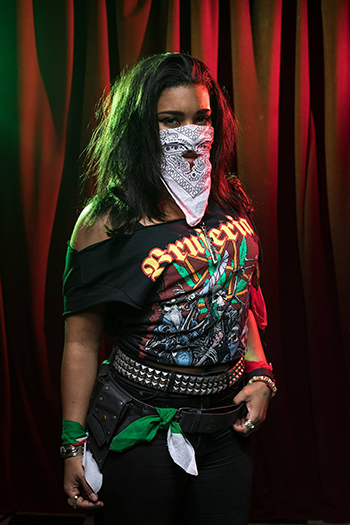
R!: And how did you end up joining Brujería? How did you meet the guys?
JP: I met Juan Brujo (vocalist) many years ago in the Webster Hall when they played in New York. I decided to jump on stage and sing along because I just love Brujería so much, I’ve been a fan for a very long time and that’s how I met them. That night was one of the greatest and funniest nights of my life actually. But that that was a significant meeting as a fan. The significant meeting as a musician was later at the Gramercy Theater and I believe this was in 2015 or 2016… they were there and we met after the show. There were twenty people after the show, after party kind of thing, and Monte Conner (former senior vice president of A&R for Roadrunner Records) was very well-known in our industry and he introduced me and Brujo as a formal introduction even though we had kind of met before. He told him about my band and all that and a year or two after that, La Bruja Pititis (former female vocalist) had moved on to other things and they needed that female voice for a lot of songs or they couldn’t play them. They can do a two hour set without playing any of those, but they were missing those songs and there was a new album also that had just come out where the female voice was in a prominent song. So they wanted to play that song and I stepped in at that point with no rehearsal, half a song soundcheck or maybe we did it once, a photoshoot, and a full sold out show at Irving Plaza in New York City was my first show. Jump right into the fire, baby!
And I saw Shane Embury all naked (laughs). It was right after we were done, the show was over and the first thing he does, he strips off all his clothes and he’s like “if you’re gonna be with us, you better get used to this, love” (laughs). ‘Cause he was all sweaty and he’s like “well… welcome to the band Jess!” (laughs).
R!: – What about your band Alekhine’s Gun? What’s the status right now?
JP: Right now everyone is moving very deeply into other situations of life. We all love playing and writing together, but everyone’s really busy with other things right now. Life starts happening and those things have a little bit more urgency and they must be taken care of, but we have been talking about getting back together and maybe put some things out in the future. Maybe towards the end of the year.
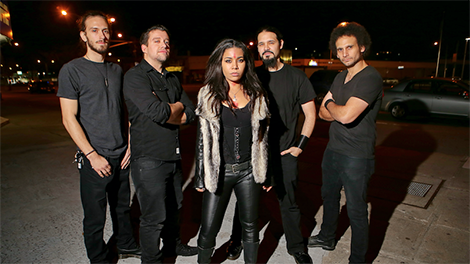
R!: – What’s the band’s name origin?
JP: Alekhin’s Gun is named after Alexander Alekhine, a famous Russian grandmaster of chess who discovered a way to always end a game, it’s called “an endgame move”, by flanking a queen with two rooks. So when we first started, we were a three piece, so it was the queen and two rooks. Once you get in an Alekhine’s Gun, it’s game over for the opponent, that’s it.
R!: – Interesting. I’m not sure if many people know the story behind the name…
JP: And one of the members was also working at a chess shop at the time. I mean, it was just too perfect. We had to do it.
R!: – You were born and raised in Brooklyn, so you were involved in the New York Hardcore scene. What are your memories from that scene in the 90’s? It was a very special time…
JP: I know the 80’s were special because it was the seed planting, but I feel like the 90’s and early 2000’s is when everything was kind of at its peak. Every band was amazing, every scene and every town was so strong and powerful and fun. It was a very special time in music and I know I’m not the only one who feels that way.
R!: – There’s an Agnostic Front song that says “I miss the Old New York”. Do you feel the same way?
JP: Of course! We always say that: “I miss New York”. Sometimes you walk around and you’re like “what happened to New York?”. The only thing you can count on in New York is that it will change. Everything will change eventually and we have to adapt to it for sure. It’s also a different time for the hardcore scene because things are very different now than they were then. Even just having all the information in the world in your hand at all times has changed a lot of things. The struggles are not the same, the day to day life is not the same, the things we worry about are not the same, so it was also that combination of time and place in the world that made everything so special.
R!: – Coming back to more recent times, how did the collaboration with Slayer arise?
JP: That’s a great question. I think it was Nuclear Blast’s Gerardo Martinez. He knew that they were making a movie and we had met several times, all of us. I loved Slayer from when I was a teenager, still do and always will. One of my favorite bands. We hung out many times and it seemed like a no brainer for me to do this film because I knew I could handle it and there’s so much footage that I wish it would ended up in the movie… but I’m working on that, I’m getting the B-rolls.

R!: – Well, they announced they’re reuniting for a couple of shows at least. Maybe…
JP: Maybe they pull it out (laughs). You never know. Because that was actually one of the projects I’m most proud of in my life. The b-roll movies where we actually went into the pit during the show, we shot one of the murder scenes in the pit and no one knew what was going on. That was so fucking cool! (laughs). And there’s one point where I’m looking for the guy, you know? Everyone’s on the floor dancing, jumping up and down in the pit or whatever and I’m like pushing people, kicking them out of the way and I’m looking for a man and I turn around and they’re behind me and then this two giant fire balls just go to the sky (Editor’s note: she makes a sound like an explosion) and I was like “that is the coolest shit I’ve ever done in my whole life, can’t wait to see this!”.
R!: – What would you say is more challenging for you? Being on stage with a band or acting in a movie?
JP: There are different challenges. Music is coming from my heart, my feelings, I’ve created it whereas acting I have to become something else. I’m still using my emotions, my heart, my experiences, but this is me transforming into someone else. In music it’s me revealing who I am. So that’s two different things. Also the schedules are much different (laughs). You know? When you’re doing movies or TV, your days are extremely long, a lot of waiting around doing nothing and then when you work you have to be very intense and there’s a lot of distraction and that work lives forever, just like when you make an album. But then on the other hand, when you’re on stage as a musician you get that instant gratification when you’re done playing. You can connect directly with the audience and you can see if they’re feeling it or not, or if they love you or they hate you. You get to see that connection whereas when you do a movie you won’t know for a year or two from now because everything that we film, we don’t see it until a year later. So you’re doing all this work and it’s like you’re throwing your feelings into this big hole and you’re waiting for the tree to grow later.
R!: – Do you know any other actors who are metalheads like you?
JP: Michael C. Hall from Dexter. He’s a real metalhead. As far as actors that I deal with, I don’t really know too many, no. Also (Brian) Posehn is another metalhead, he had his own show on Gimme Radio which is no more.
R!: – How did you become interested in Buddhism? Do you follow any practices?
JP: Yes, that’s a big part of it. I got into Buddhism when I was in my late teens. I was very fortunate to grow up in New York. Knowing that this is what I wanted to pursue, I did the New York kid’s version of that quest where you go to find the master except that this is the 90’s and I’m in Dr. Martens and big cargo pants and big gas station shirt (laughs), and you go to Chinatown and you go to this place and you’re looking for the master and all that. One day I was very lucky, in Central Park there was a Buddhist festival and every teacher from every school from all kind. There’s many different schools of Buddhism just as there’s many schools of Christianity and I saw one that I said “that’s it, those are the people that I need to be with”. I was very lucky to meet my teacher Rinpoche Lebsang Tharchin from Tibet who was now living in New York. He was the abbot of Sera Mey Monastery appointed by Dalai Lama. He’s very wonderful, like a father figure to me. He’s the one that wanted me to continue being an actor, a musician and continue on this path. Because I was just like over the bullshit of the world and he said that I could touch and help a lot of people by living in the United States where people listen to rockstars and movie stars and that they were not going to be able to listen to me if I’m in a cave by myself dressed weird with a shave head. He said I should go out there and be myself, help people and do great things and use the talents to make the world a better place and more fun. He wanted me to do this.
As far as stress reduction, there are many wonderful meditations that you can do. Sometimes the simplest one is just breathing. Nice and easy breathing. Sometimes if you stress out and your mind is going crazy, concentration exercises help a lot, so you just try to focus on exactly the thing that you’re doing right now. Try not to think about what happened before, it’s like training your mind, like lifting weights. The more you do it, the more you develop that skill, the easier it gets, and then you’ll be able to just snap your fingers and calm down which is great. Specially as a performer, you get adrenaline surges, no matter how long you’ve been doing it, there’s always that little freakout sometimes and you need to compose yourself. So those types of meditations or even walking meditation where you’re just very hyper aware of putting all your focus into that moment. That definitely helps stress. And a lot of times stress is caused by selfishness, we’re worried about what’s gonna happen to me, the things I need, the things I don’t have… One thing we do is Tonglen which is “giving and receiving”. Instead of worrying about your problems, just take a moment and think of someone else and what they’re going through and what they’re feeling, and you imagine yourself being the solution to their problem, how could you help them. Maybe you can’t help them, but you at least see that you’re not alone, that you’re not the only one who’s suffering and sometimes you need to remember that people have things much worse than you and that kind of calm things down. Sometimes we think we have problems but really the problems that we stress out so much about are things that people dream of in their life. Sometimes you need to put things into perspective and when you do that, you realize that you’re creating stress because everything is in your mind.
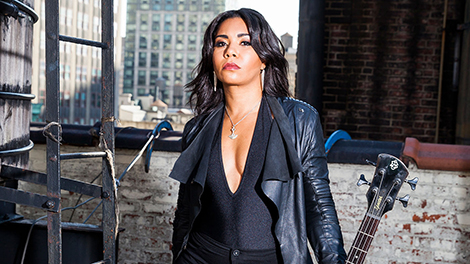
R!: – How is your life going in Sweden? It’s very different from the US, so what do you like from there?
JP: I like free healthcare because I just lost mine. As an actor, you have to work a certain number of days in order to have your healthcare but I don’t know if you know, but the writers and actors went on strike last year. So we were shutdown for 265 or 266 days and you have to make a certain quota, so pretty much almost every actor… unless you’re a very high paid actor in the sense that you can make this in a couple of days, but there was no work before that strike and then it was very slow getting back after the strike. So yeah, free healthcare is amazing. Just in general, I feel very at home in Sweden, so it’s not a big learning curve for me as a New Yorker.
R!: – You have a new short film…
JP: “Martillo de las Brujas”!
R!: – Are you acting and producing?
JP: Yes, actor and executive producer of the film. It’s a passion project with two people I love and believe in. I think they’re gonna be everywhere. When you see people like that, you should really support them and do what you can to push them forward, so I wanted to produce it and get it out there because I think it would be an amazing full-length film. It’s in Spanish and it’s a short film with four people and one of them is Satan (laughs). Earlier today I said in the panel that Latinos weren’t represented in horror films, but that’s not true, that’s not accurate, because when you go to Spanish speaking countries, some of the best horror movies are from there, but I didn’t see that in America and that’s really what I meant.
R!: – What other projects are you working on right now?
JP: I have a few musical projects going on. One is with Seven)Suns, they do extremely aggressive string music, they covered a Dillinger Escape Plan album on strings, that’s their style. So I’ll be writing lyrics and vocal lines for them. Then I have another project with Sergio Vega from Deftones and Quicksand. And my other band Black Heart Sutra, they’re a two piece actually with multiple singers, and they just went back into the studio, so I’m sure I’m gonna be screaming my face off again very soon for them.
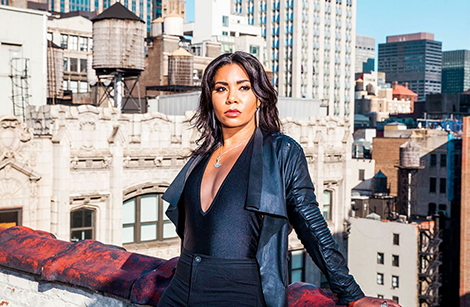
R!: – Are you going to stay for the whole festival?
JP: Yes, we have nothing going on right now. It’s a very rare occasion that we can actually enjoy a festival. Usually I’m there with my husband (Meshuggah’s Tomas Haake), but it’s like you go, you play and then you leave. But now there’s so many friends that I haven’t seen in so many years.
R!: – Is there any band in particular that you’re looking forward to seeing?
JP: Taake. I wanna see Crypta too. Cattle Decapitation is playing, the last time Alekhine’s Gun played was with them. What a great show that was. You should have seen my husband’s face, he doesn’t go to metal shows often. If he goes to a metal show is because I’m dragging him.
R!: – That’s a surprise (laughs)
JP: Yes, that’s a surprise (laughs). He prefers smooth sounds… Then we have Mantar who just played with Meshuggah. I didn’t get to see that tour. But yeah, Sunday is my day on this festival with Cynic, Finntroll and Taake.
R!: – Thanks a lot for the interview, muchas gracias.
JP: De nada, gracias a ti (Editor’s note: “You’re welcome, thank you” in Spanish).



